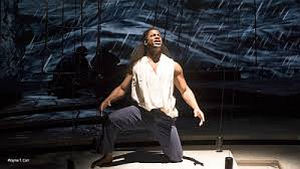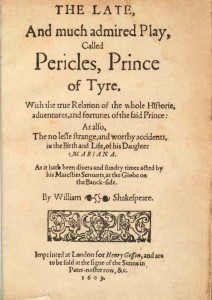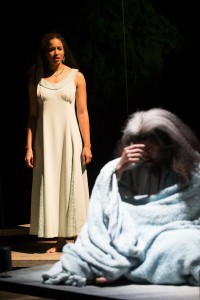On 13 November 2015, for the first time since its opening in 1992, Pericles is to be staged at the Folger Theatre in Washington, DC. The production premiered at the Oregon Shakespeare Festival in February 2015 and after its season in Washington it will transfer to the Guthrie Theater in Minneapolis. It is directed by Joseph Haj and features Washington, DC local man Wayne T Carr in the title role.
The play was an immediate hit on its opening in Oregon, reviewers surprised to find this little-known play so entertaining. It’s one of those plays that almost always works on stage, combining spectacular scenes of shipwreck and pageantry, exotic locations, romantic love, loss and rebirth.
The play’s stage history is a bit thin until recent decades, though it was popular when first staged, with six quarto editions published between 1609 and 1635. Pericles was one of Thomas Betterton’s favourite parts in the late seventeenth century, and in the nineteenth century Samuel Phelps, a leading actor-managers, revived it successfully. Until recently, though, those approaching the play must always have felt, like Bottom on reading Pyramus and Thisbe, that “there are things in this comedy…that will never please”. Shakespeare’s play includes incest, prostitution, attempted murder, corruption and deceit.
Pericles received its first performance in Stratford-upon-Avon in 1900 when Mr John Coleman, an elderly tragedian aged 72 performed his own adaptation. The play had been suggested some months before, but Sarah Flower, wife of the theatre’s owner, had objected to the bawdiness. “Pericles will never do to act here”, she wrote, but busy with an extended London season, Benson took up the offer from Coleman regardless. Writing to reassure her, Benson said “there is nothing objectionable in Coleman’s version. I should not mind my little girl of 10 coming to see it”.
By the time Coleman had excised everything in the play that audiences might find offensive there was little of the original left. He hoped he had “succeeded in retaining the vivid dramatic interest which, in the earlier days of the play, secured for it so great and abiding a popularity”. Sally Beauman, in her book The Royal Shakespeare Company: A History of Ten Decades, describes how “He removed the first act; cut most of the second; cut Gower completely, and eliminated all sexual explicitness, including most of the fourth act.
In his foreword, Coleman justified his changes: Shakespeare wrote “all the inspired passages of the play, while the irrelevant, inept and revolting lubricity of the first and second acts, the loathsome brothel scene, Act IV and the inept Gower recitals may, with some show of probability, be accredited to his alleged colleagues, Williams and Rowley”. There were so many omissions that Coleman had to add a lot of his own material, though in omitting so much of the story, what was left was “almost totally incomprehensible”.
The play was performed on 24 April as the Birthday Play, when the theatre was packed from floor to ceiling by the great and good of the area. Local reviewers were inclined to be kind, admiring the beauty of the sets and the costumes. The Leamington Spa Courier described it as a “splendid tribute to the genius of [Stratford’s] great son, featuring spectacular effects and archaeological accuracy and delightful incidental music. Coleman himself played Pericles: the great romantic novelist Marie Corelli admired Coleman, considering that “his manner, his elocution, his art of gesture must all be a revelation to Stratford”. The company included regular Stratford favourites Oscar Asche as Cleon, Lily Brayton as Thaisa and Matheson Lang as Cerimon.
The reception was not all favourable. The Courier again, commenting on the way entire scenes had disappeared and new ones introduced: “It will not be surprising if Mr Coleman is taken severely to task for his free editing and bold interpolations”. He was indeed, particularly by the national critics. Literature described it as a “tragic bungling” and according to Sally Beauman again, it has gone down as “the worst travesty of a Shakespeare play ever to be presented [in Stratford]”.
Even so, it must be assumed that among the “inspired passages” Coleman left intact was the scene in which the young Marina is reunited with her father Pericles. It’s one of Shakespeare’s finest, and it’s all about the power of words. When Pericles sees Marina she reminds him of his lost wife and their child:
My dearest wife was like this maid, and such a one
My daughter might have been: my queen’s square brows;
Her stature to an inch; as wand-like straight;
As silver-voiced; her eyes as jewel-like
And cased as richly; in pace another Juno;
Who starves the ears she feeds, and makes them hungry,
The more she gives them speech.
In telling him the story of her own life, she gives him his life back:
Give me a gash, put me to present pain;
Lest this great sea of joys rushing upon me
O’erbear the shores of my mortality,
And drown me with their sweetness. O, come hither,
Thou that beget’st him that did thee beget;
Thou that wast born at sea, buried at Tarsus,
And found at sea again!
And with a word Marina finds her own lost father:
Is it no more to be your daughter than
To say my mother’s name was Thaisa?
Here’s wishing the production in Washington success after their long wait for this magical play.




